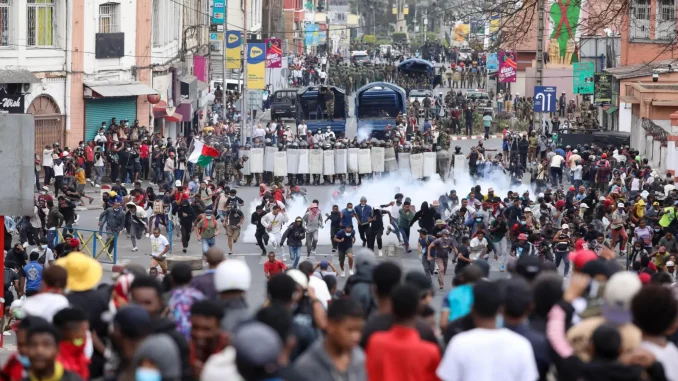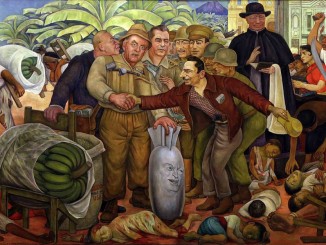
In September, hundreds of thousands of mostly young protesters marched in the streets of Nepal, demanding an end to their corrupt government that oversaw poverty and suffering for the majority while a corrupt political caste and capitalist ruling class skimmed off the wealth of society for themselves. Within weeks, their protest had brought down the hated political leaders. In the weeks since, a debate has taken place both online and in the halls of government about what their new government should look like and what its priorities should be. What will come of it is still unclear, as the traditional ruling parties are working hard to influence events and stop fundamental change.
Just a few weeks later Madagascar, the island nation of 31 million off the coast of East Africa, also erupted in a state of revolt. In the last week of the month, a group calling itself the Gen Z Madagascar collective used social media apps like Instagram and TikTok to spark nationwide protests that brought hundreds of thousands of young protesters into the streets and brought down the island’s political leadership. But as in Nepal, unless a deeper social revolution takes place, a new leadership is unlikely to make the changes the masses of the population want.
Madagascar was a colony of France between 1895 and 1960. French imperialism exploited the island nation’s natural resources, which included numerous mineral resources necessary for industry, plus oil reserves and export crops. France also valued its strategic location on the coast of East Africa, allowing France to project military influence along the African coast and into the Indian Ocean. Although the island became an independent nation in 1960, it remained part of what was called the French Union. In name, the French Union gave some voice to France’s former colonies, but actual decision-making power remained centralized in the French government. This allowed French capitalist interests to continue to shape Madagascar’s political leadership while also continuing to exploit the island’s natural resources. Although the French Union was formally nonexistent by 1960, the pattern had been set, and French corporations were deeply entrenched in the economies of the former colonies.
Today, major French corporations like Total, Orange, BNP-Paribas are still directly active in or own subsidiaries in Madagascar, while numerous other French business interests own or control portions of some of Madagascar’s largest companies. Many of the island’s wealthiest people are French-Malagasy and tightly connected with French interests. These economic powers shape the political leadership, and corruption is rampant. This capitalist class does not want to lose their power and privileges.
On the other hand, the masses of working people in Madagascar struggle just to make ends meet. An estimated three-quarters of the island’s population lives in poverty (less than one Euro [$1.16] per day), large parts of the rural population suffer from malnutrition, child labor is common, energy prices are unaffordable and rising, power outages are normal, water is often scarce, and students endure miserable conditions in even the best schools.
In this context, young people began to commiserate online and then organize for protests much like in Nepal and Bangladesh before. On September 25, the first of the protests began, with youthful protesters blocking roads, burning tires, and marching in the streets of the capital, Antananarivo, and other cities and towns. As the weeks passed and protests continued, police went on the offensive, using tear gas, rubber bullets and stun grenades to try to repress the protests. 22 were killed in the chaos. This repression only made protesters angrier, and in mid-October, as tens of thousands filled the streets of the capital, an important military unit actually joined the protesters, forcing the president to step down and flee the nation in a French military plane.
Since then, the political situation has been in flux, yet the powers-that-be are clearly working to shape the situation to retain their dominance. Within days of the president’s flight from power, a colonel in the military was declared president. This isn’t the first time the Malagasy military has played a role in politics. Since 1972, after the repression of both peasant and student uprisings, military leaders have ruled the nation for years at a time and taken part in several coups. In his very first speech as president, the colonel said openly that his new government would work to establish a “peaceful and secure business climate.” Almost immediately, he appointed a billionaire executive of BNI, a partially French-owned bank, as prime minister.
This shows that his real priority isn’t the voice of the people, or the needs of the working class and the poor, but the continued stability for business and commerce – in other words, the capitalist class and their French imperial supporters. These are the very same forces that have overseen the continued presence of French imperialist interests and the continued immiseration of the Malagasy people. These are not saviors of the people. They are just a change of face of those in political power.
As in Nepal, we see a movement of the youth and the poor, infuriated by corrupt politicians and their business alliances, hitting the streets to express their fury and demand change. In both cases, they have been able to force out the most visible political leaders who are the targets of their rage. But whether these uprisings will deepen into social revolutions that aim to dispossess the ruling capitalists of their riches and power remains to be seen.
In both Nepal and now Madagascar, the working and poor people have the chance to make deeper, more fundamental changes in their nations. But to do so, they’ll have to look beyond the most visible political leaders and look at who currently controls the productive capacity of their nations – the big businesses, the millionaires and billionaires, and the foreign imperial interests which stand above them all. Most importantly, working people need to look to themselves in order to fight independently for their own interests.
If not, then we will likely continue to see the same revolving door of politicians and generals and business leaders, over and over and over, all overseeing the same conditions as before. If workers do take independent initiative, then they have a massive opportunity to change their nations and the conditions under which they live, which would represent a genuine hope for all of humanity.



